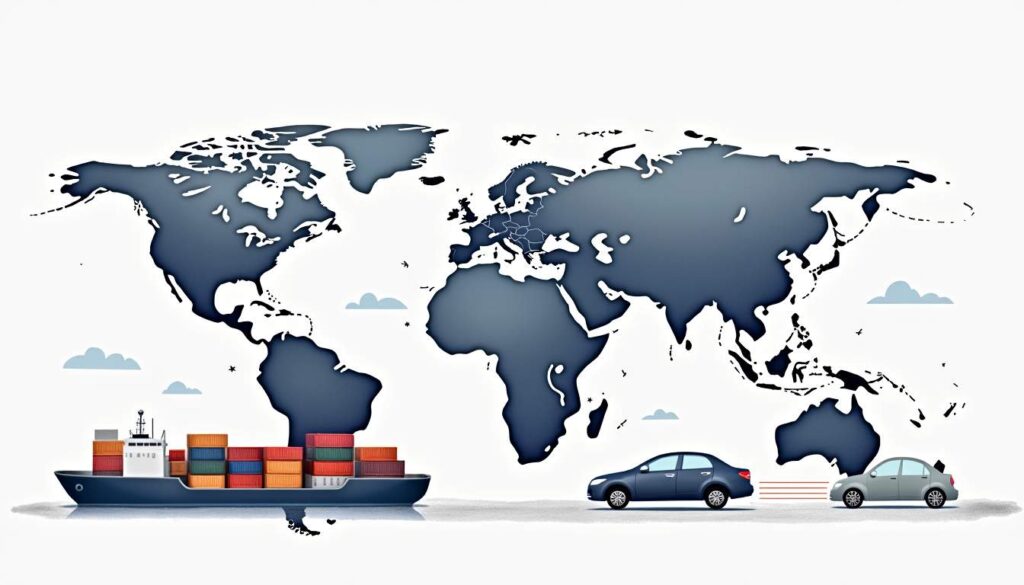Relocating your car internationally can seem daunting, but with the right knowledge and preparation, it can be a smooth process. In this guide, we’ll walk you through essential aspects of international car relocation, from planning to choosing the right shipping company, as well as understanding legal requirements and what to expect during the shipping process.
Understanding the Basics of International Car Relocation
The concept of international car relocation encompasses transporting your vehicle from one country to another. This can stem from various reasons such as moving for work, relocation for family, or even purchasing a car abroad. No matter the reason, understanding the fundamental aspects will set the tone for a hassle-free experience.
The Importance of Proper Planning
Proper planning is critical when relocating your car internationally. This involves establishing a timeline, understanding costs involved, and making informed decisions about shipping methods. Planning allows you to avoid last-minute hiccups, which can lead to higher costs or delays.
Start by assessing your timeline for moving and determine when you want your car to arrive at its new destination. The more lead time you give yourself, the better prepared you will be. Additionally, create a checklist of tasks to complete before your moving date to ensure nothing is overlooked. This checklist can include tasks such as gathering necessary documents, researching shipping companies, and scheduling inspections or repairs if needed. Having a well-structured plan not only alleviates stress but also ensures you have everything in order for a smooth transition.
Key Terms and Concepts in Car Relocation
Familiarizing yourself with key terms is essential in understanding the car relocation process. Some of the terms you might encounter include:
- Bill of Lading: A legal document between a shipper and carrier detailing the goods to be transported.
- Chain of Custody: The transportation path a car takes from pickup to delivery.
- Customs Clearance: The process of clearing your vehicle through customs at the destination country.
These terms will help streamline your communication with shipping agents and avoid misunderstandings during the relocation process. Additionally, it’s beneficial to understand the various shipping methods available, such as container shipping or roll-on/roll-off (RoRo) services. Container shipping offers more protection for your vehicle, while RoRo is often more cost-effective and quicker. Knowing the pros and cons of each method can significantly impact your decision-making process and overall satisfaction with the relocation experience.
Moreover, it’s important to consider the regulations and requirements of the destination country regarding vehicle importation. Different countries have varying rules about emissions standards, safety regulations, and even taxes that may apply to imported vehicles. Researching these regulations beforehand can save you from potential fines or complications upon arrival. Engaging with a customs broker can also be a wise choice, as they can navigate the complex paperwork and ensure compliance with local laws, making the entire process more manageable for you.
Preparing Your Car for International Relocation
Before you ship your vehicle, it’s crucial to prepare it properly. Taking the time to check the vehicle’s condition will prevent complications later, ensuring it arrives safely and without issues.
Necessary Maintenance Checks
Conducting necessary maintenance checks can save you from potential problems during transit. Ensure the brakes, lights, and tires are functioning properly. Check fluid levels and consider having a mechanic look over the car to confirm it’s in optimal condition.
Moreover, it’s smart to take detailed photographs of your car before shipping it. These photos will serve as a record of your car’s condition, useful in case of damage claims later on. Additionally, consider documenting any existing scratches or dents in a written report, as this can further substantiate your claims if needed. Keeping all maintenance records handy can also be beneficial, as some shipping companies may require proof of recent service to ensure that the vehicle is roadworthy.
Cleaning and Emptying Your Vehicle
Cleaning your vehicle thoroughly helps avoid customs issues, as some countries have strict regulations about transporting organic materials. Use a vacuum to remove any dirt or debris and wipe down surfaces to keep your vehicle in top condition.
Additionally, ensure that you empty the car of personal items. Not only does this prevent loss or damage to your belongings, but it is also important for international customs regulations, which often prohibit or limit the transport of personal items in vehicles. Furthermore, removing items like GPS devices or toll transponders can help avoid any potential fees or complications during transit. It’s also advisable to check your fuel levels; many shipping companies require that the fuel tank be no more than a quarter full to minimize the risk of spillage during transport.
Choosing the Right International Car Shipping Company
Finding a reliable international car shipping company is one of the most important steps in relocating your vehicle. The company you choose will impact the price, security, and the overall success of your shipment.
Evaluating Reputation and Experience
Start by researching shipping companies, looking for reviews and testimonials from previous customers. A company with a solid reputation will likely have handled numerous successful relocations, which speaks to their experience and reliability.
Contact multiple companies to gauge customer service, responsiveness, and transparency in their processes and pricing. A reputable company will be happy to answer all your questions and provide clear information about their services.
Understanding Pricing and Insurance Options
Price is an important factor when choosing a shipping company; however, it should not be the only consideration. Ensure that you fully understand what is included in their quote, such as pick-up fees, shipping charges, and additional costs for insurance.
Insurance is vital when shipping your vehicle internationally. Look into their coverage options and if additional insurance is necessary to protect your vehicle in case of unforeseen damages during transit.
Navigating the Legalities of International Car Shipping
Understanding the legalities involved in international shipping is crucial. Various regulations and laws apply when transporting vehicles across borders, and ignorance can lead to delays or fines.
Understanding Customs Regulations
Customs regulations can vary by country, and it’s essential to familiarize yourself with these rules before shipping your car. This includes understanding duties, taxes, and any documentation required for clearance.
Consult the embassy or consulate of your destination country for specific import regulations regarding vehicles. They can provide detailed information that will help ensure your car is compliant with local laws upon arrival.
Dealing with Import and Export Laws
Besides customs regulations, you must also consider the import and export laws of both your home country and destination. This includes obtaining the necessary permits and making sure you meet all legal obligations related to the transportation of your vehicle.
Failure to comply with these laws can result in severe consequences, including fines and confiscation of your vehicle. Therefore, take the time to research and understand the local laws governing car imports and exports.
The Process of Shipping Your Car Internationally
Once your preparations are complete, it’s time to understand the shipping process itself. Knowing what to expect can alleviate anxiety and help ensure the relocation goes smoothly.
From Pickup to Delivery: What to Expect
The shipping process begins with the pickup of your vehicle. A representative from the shipping company will come to collect your car, and you will need to provide the necessary documentation such as ownership papers and identification.
During transit, you can usually track your vehicle’s journey, giving you the peace of mind that your car is moving toward its destination safely. Delivery will occur at a predetermined location, where you will need to inspect the car and confirm it is in the same condition as it was at pickup.
Dealing with Delays and Other Challenges
Delays can occur during the shipping process due to weather, port congestion, or customs issues. Being prepared for these possibilities will make them easier to handle if they arise.
Maintain communication with your shipping company throughout the process. They can provide updates and guidance if any challenges come up, ensuring you stay informed and are able to adjust your plans accordingly.
Relocating your car internationally involves many steps, but with thorough preparation and informed decision-making, you can streamline the process. Trust in the information provided here to make your car relocation smooth and successful.
















